Top 14 Best Automated Testing Tools For Web Applications
Learn with AI
Automated testing tools for web applications are essential if you want faster, more reliable releases. They help catch bugs early, reduce manual testing effort, and ensure a seamless experience for your users.
But with countless tools available, choosing the right one for your needs can feel overwhelming. Should you pick open-source browser testing automation tools, or do premium web application functional testing tools make more sense for your team?
In this article, we'll simplify your search by highlighting:
- The top automated browser testing tools
- Strengths and ideal use cases for each tool
- Which tools best integrate into your existing workflow
- How to select the right website automation testing tools for your project
Ready to streamline your testing process? Let’s jump in!
How to choose automated testing tools for web applications?
Choosing the right automated testing tools for web applications makes a huge difference in your testing efficiency and product quality. Picking the perfect tool depends heavily on your team's specific needs and project requirements.
Here are the key factors you should always consider when selecting tools for automating website testing:
- Ease of integration: The best automated browser testing tools fit seamlessly into your existing workflow. Check how easily they integrate with your development ecosystem and existing tools.
- Support for cross-browser testing: Users access your apps from various browsers and devices. Select browser testing automation tools that effectively test across popular browsers like Chrome, Firefox, Safari, and Edge.
- Scalability: Your testing needs grow with your application. Pick web application functional testing tools that effortlessly scale as your project becomes larger and more complex.
- Reporting and analytics: Effective test reporting helps you quickly spot and resolve issues. Prioritize website automation testing tools that generate detailed and clear reports with actionable insights.
- CI/CD compatibility: Continuous testing is vital in modern development. Look for tools that easily integrate into your continuous integration and deployment (CI/CD) pipelines.
Let's also meet @Coty Rosenblath, ex-Mailchimp Director of Data Systems, who's going to share his thoughts on the trade-offs between using open-source tools and a commercial solutions:
With these factors in mind, let's explore the curated list of the best automated testing tools for web applications to streamline your testing process.
Top 14 automation testing tools for web applications
1. Katalon [Strongest web automation testing tool]

Katalon stands out as one of the most powerful automated testing tools for web applications.
With its all-in-one capabilities, Katalon enables you to effortlessly handle UI, API, and even mobile testing within a single platform.

One key advantage of Katalon is its no-code and low-code approach. You can easily create robust test cases using Katalon's built-in automation frameworks without writing extensive scripts. This significantly reduces your test setup time, allowing you to focus more on strategic testing efforts.
What's great is that you can also code with Katalon. This flexibility means teams of all technical level can get started quickly with Katalon.
Not just that, Katalon also comes with test execution, test management, and test analytics built into one single platform:
- Versatile test execution: Run tests locally, remotely, or on cloud environments, including emulators and simulators. With over 3,000 environment combinations at your disposal, website automation testing is simpler than ever.
- Parallel test execution: Boost your testing efficiency by running tests in parallel via the Command Line Interface (CLI) with Katalon Runtime Engine.
- Advanced CI/CD integration: Seamlessly integrate automated browser testing into your CI/CD pipeline, automatically triggering tests when new code is merged.

Katalon also leads the AI testing wave with TrueTest:
-
TrueTest identifies and visualizes actual user flows, so your team knows exactly which paths to prioritize.
-
TrueTest allows you to convert on-web user journeys into ready-to-run automated scripts, reducing test creation time.
- Once you receive AI-powered test recommendation from TrueTest, you can fine-tune all of that in Studio, execute at scale with TestCloud or Runtime Engine, and manage results seamlessly in TestOps.
Pricing is transparent with a free version for small teams or projects and flexible paid plans that scales with your team’s needs. On G2, users rate Katalon really highly, with a 4.4-star rating, reflecting strong user satisfaction (See reviews on G2).
If your team seeks a fully customized experience, you can request a tailored demo directly from Katalon to better match your project requirements (Request a demo here).
Visit Katalon Website | Pricing | G2 Reviews
2. Selenium [Globally loved test automation framework for websites]

Selenium is the benchmark among open-source browser testing automation tools, widely recognized for its flexibility, power, and strong community support.
With its core component, the WebDriver API, Selenium lets you automate browser interactions effortlessly.
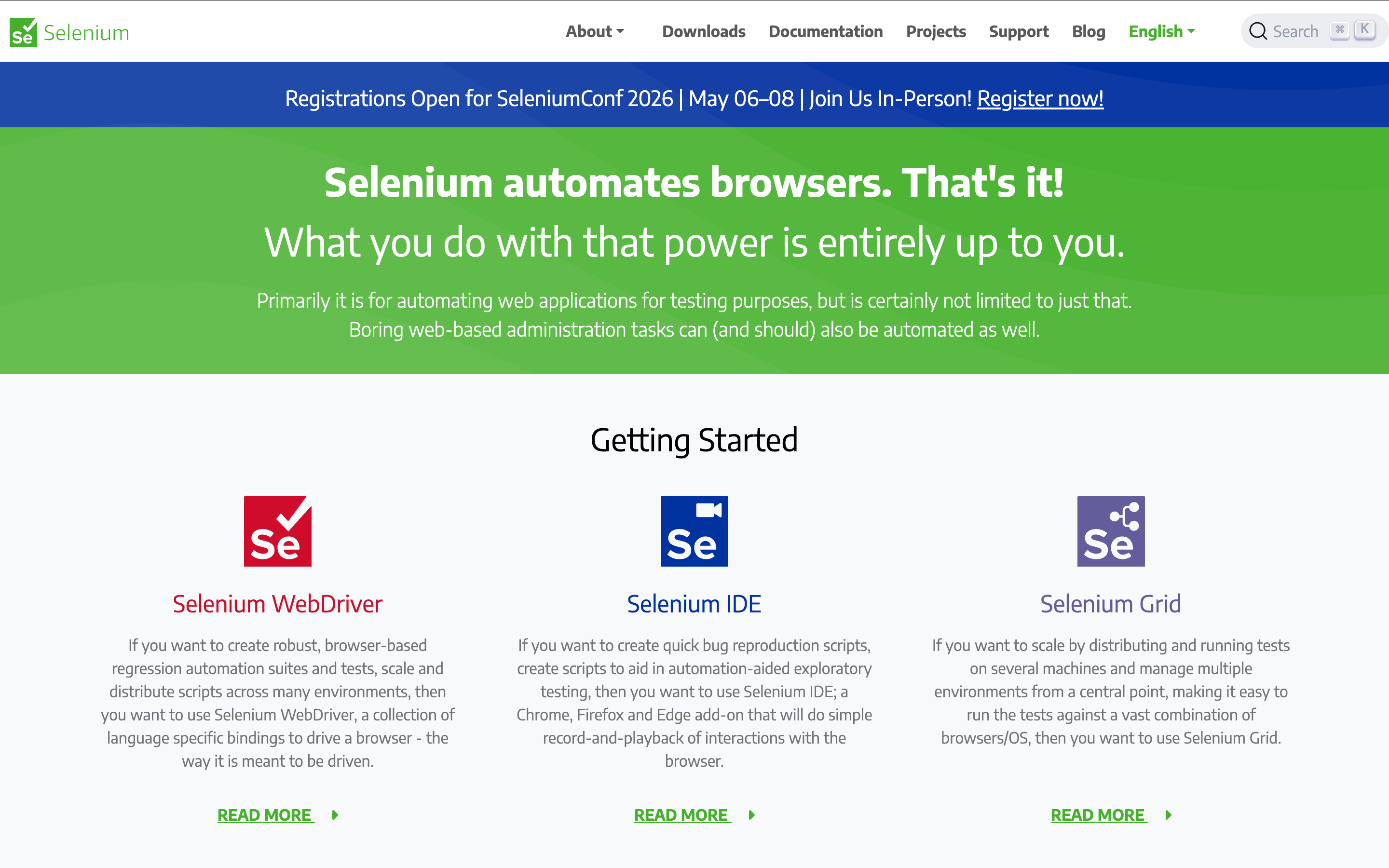
Supporting multiple programming languages (including Java, Python, C#, JavaScript, and Ruby), Selenium empowers teams to build custom automation frameworks that precisely match their workflow. Its large, active community continuously contributes extensive documentation, tutorials, and support, simplifying your automation journey.
Selenium's greatest strength lies in its adaptability. Whether you're performing simple website checks or complex, data-driven tests, it scales seamlessly with your testing requirements.
Typical use cases for Selenium include:
- Cross-browser compatibility tests.
- Regression testing for frequent code updates.
- Integration with various CI/CD tools for continuous testing.
Although Selenium demands programming skills, teams comfortable with coding find it ideal for creating highly customizable, robust web application functional testing frameworks. For testers seeking a reliable, proven open-source solution, Selenium remains a go-to choice.
Visit Selenium Website | G2 Reviews
3. Cypress

Cypress is a modern, developer-focused automation testing tool for web applications, tailored specifically to streamline testing in agile development environments. Front-end developers appreciate its speed, simplicity, and intuitive user experience.

One standout feature of Cypress is its real-time reloading capability. As soon as you make changes to your tests, Cypress automatically reloads them, providing immediate feedback. This dramatically accelerates the testing cycle, allowing developers to iterate rapidly.
Debugging is also effortless with Cypress, thanks to built-in debugging tools. The visual test runner clearly shows each step of your tests, making it simple to identify and fix issues quickly. Additionally, its powerful network stubbing enables developers to simulate backend responses, testing front-end behaviors independently.
- Seamless CI/CD integration: Cypress integrates smoothly with leading CI/CD platforms, ensuring continuous testing throughout your build cycles.
- User-friendly interface: Even developers new to automated browser testing tools quickly become proficient due to Cypress's approachable design.
If your agile team values rapid, reliable tests with minimal overhead, Cypress offers an efficient solution for automating website testing.
Visit Cypress Website | G2 Reviews
4. Playwright

Playwright, developed and backed by Microsoft, is an end-to-end automation tool rapidly gaining popularity for cross-browser testing of modern web applications. It offers comprehensive support for major browser engines, including Chromium, Firefox, and WebKit.
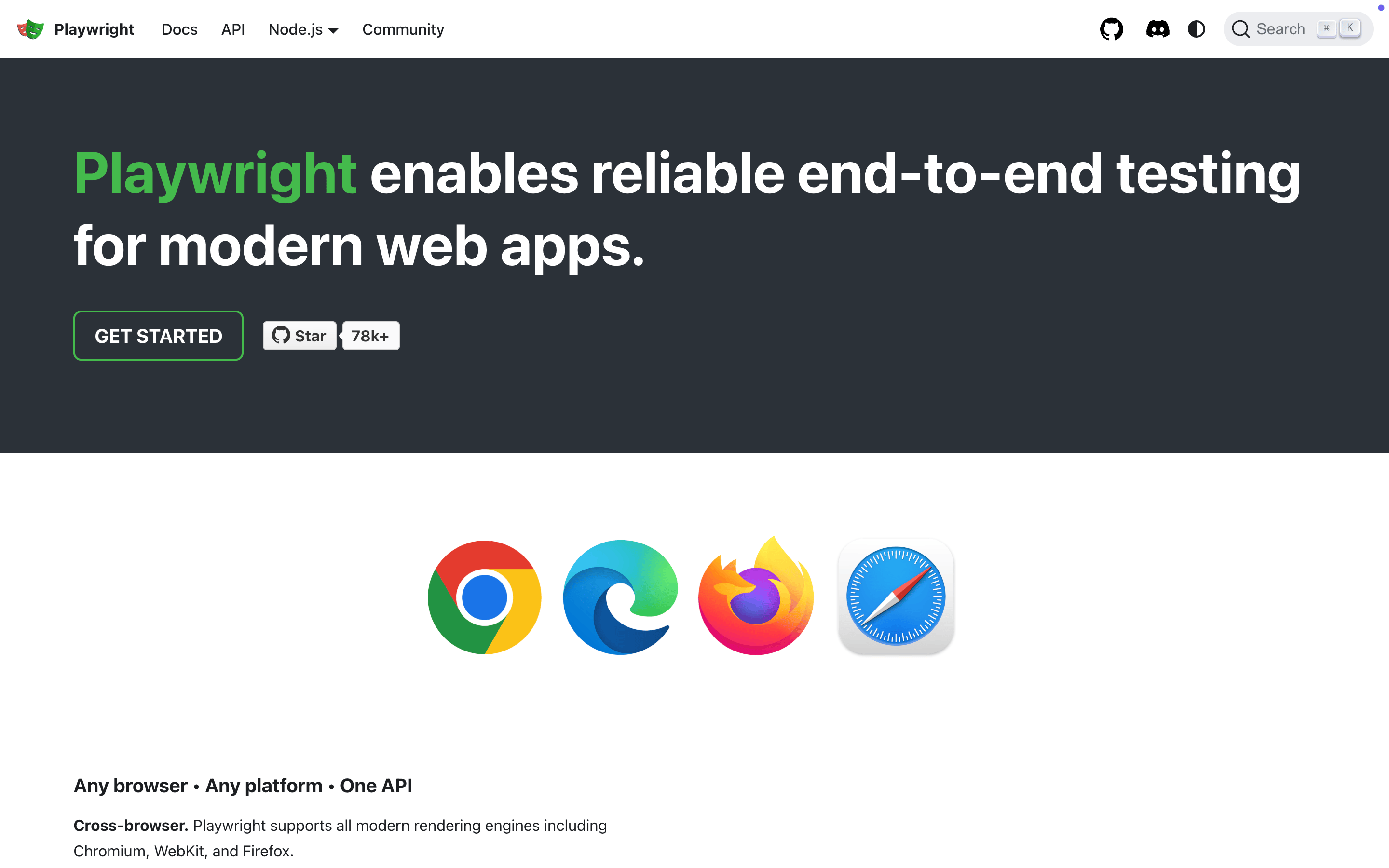
One of Playwright's most powerful capabilities is parallel execution. Tests run concurrently across different browser environments, substantially cutting down test execution times. This makes Playwright ideal for teams needing fast, efficient cross-browser validation.
Besides robust UI automation, Playwright provides built-in API testing functionality. Its cross-platform compatibility ensures consistency across Windows, macOS, and Linux.
Playwright suits modern development workflows well, thanks to its easy integration with CI/CD pipelines. Teams using tools like Jenkins, Azure DevOps, or GitHub Actions can effortlessly incorporate Playwright into their continuous testing strategy.
For testers looking for powerful, cross-browser capable, and reliable web application functional testing tools, Playwright is a top contender worth considering.
Visit Playwright Website | G2 Reviews
5. SmartBear TestComplete

TestComplete is a versatile automated testing tool that caters to both codeless and script-based approaches for web and desktop applications. It stands out with its powerful object recognition engine, accurately identifying UI elements to ensure reliable, repeatable tests.

The record-and-playback feature simplifies test creation, allowing users to quickly automate test scenarios without extensive coding knowledge. Experienced testers benefit from its robust scripting support, providing flexibility to create sophisticated web application functional testing solutions.
- CI/CD integration: Easily integrate TestComplete into popular CI/CD systems such as Jenkins, GitLab, or Azure DevOps for continuous test execution.
- Cross-browser compatibility: Execute tests across major browsers seamlessly.
- Comprehensive reporting: Access detailed test logs and reports, simplifying troubleshooting and analysis.
Pros:
- User-friendly codeless automation.
- Advanced scripting capabilities.
- Effective integration with CI/CD pipelines.
Cons:
- Licensing may become costly for larger teams.
- Initial setup requires investment in learning.
TestComplete remains a reliable choice for teams needing both simplicity and flexibility in automated browser testing tools.
Visit TestComplete Website | G2 Reviews
6. Ranorex Studio

Ranorex Studio is a comprehensive, cross-platform automation testing tool designed to streamline testing efforts for web and desktop applications. Its balanced approach of codeless test creation combined with flexible scripting appeals strongly to enterprise-level teams.

The tool’s intuitive, drag-and-drop interface empowers testers to rapidly build automated tests without extensive scripting experience. Yet, it also supports robust scripting options using languages like C# and VB.NET, catering to advanced testing scenarios.
- Seamless DevOps integrations: Ranorex smoothly integrates with various DevOps and CI/CD platforms such as Jenkins, TeamCity, and Azure DevOps, enhancing your continuous testing workflow.
- Robust reporting: Generate clear, detailed reports that simplify issue tracking and debugging.
Ranorex Studio particularly suits enterprise teams needing to balance simplicity for non-technical users with advanced scripting capabilities. Its scalability and robust DevOps integrations position it among the top tools for automating website testing within large organizations.
Visit Ranorex Studio Website | G2 Reviews
7. ACCELQ

ACCELQ is a cloud-based codeless automation platform that simplifies web and API testing through an intuitive, visual interface. As one of the innovative automated testing tools for web applications, it reduces the complexity traditionally associated with test automation.

One standout capability is its AI-powered self-healing feature. ACCELQ intelligently adapts tests to UI changes, significantly reducing test maintenance efforts. This means your tests remain robust and reliable, even when your application evolves rapidly.
- Web and API automation: Seamlessly automate both UI interactions and API validations in a unified platform.
- CI/CD integrations: ACCELQ effortlessly integrates with popular CI/CD tools like Jenkins, GitHub Actions, and Azure DevOps, enabling continuous testing cycles.
- Collaborative test management: Centralized dashboards and comprehensive reporting foster better collaboration across your QA and development teams.
ACCELQ is ideal for teams looking for easy-to-use, scalable website automation testing tools that enable collaboration and accelerate the test creation process.
Visit ACCELQ Website | G2 Reviews
8. Mabl

Mabl is an AI-driven platform designed specifically to streamline continuous testing efforts within agile teams. By emphasizing fast test creation, execution, and maintenance, it greatly enhances testing efficiency and productivity.
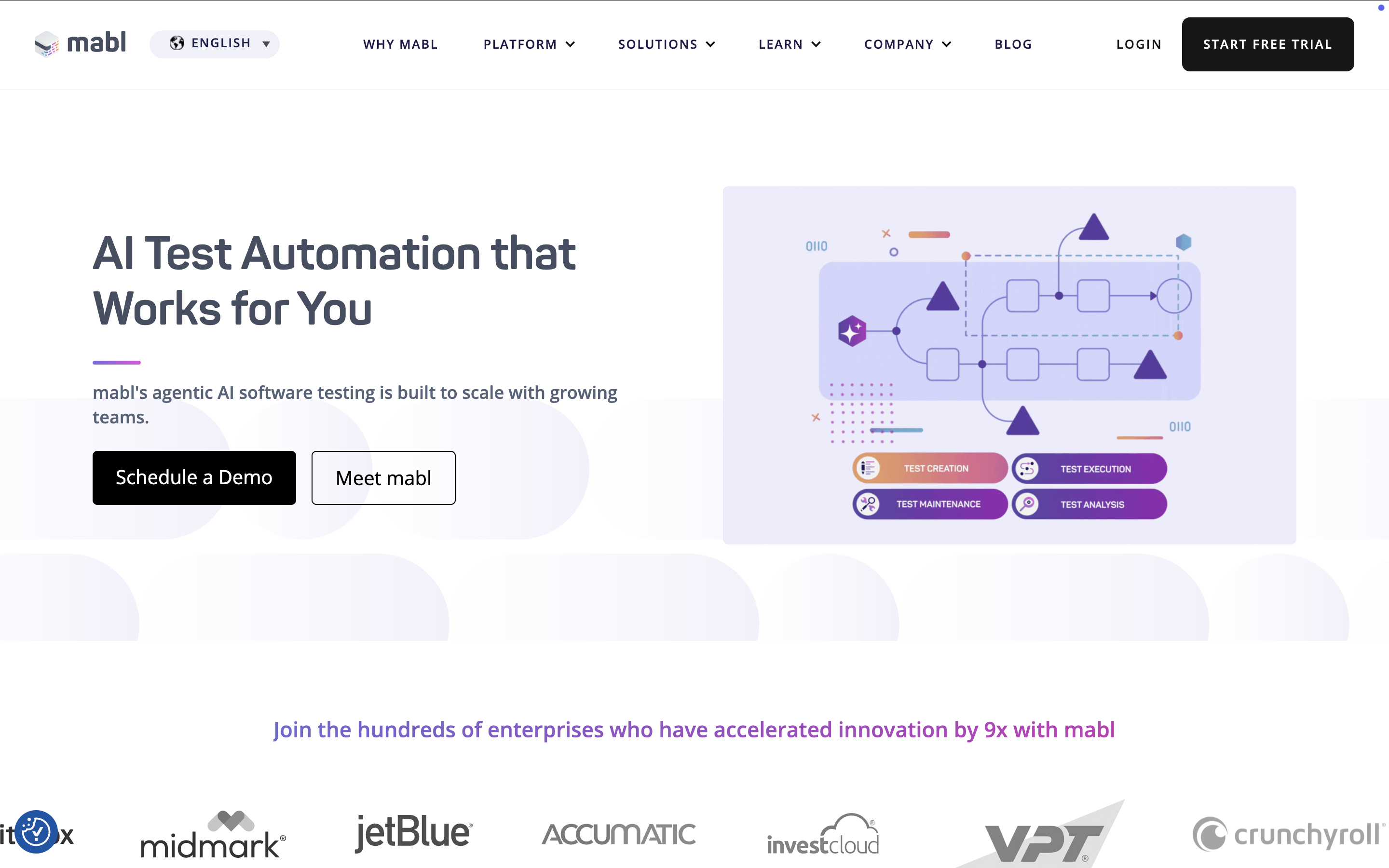
With advanced self-healing capabilities, Mabl automatically detects and adapts to UI changes, dramatically reducing test maintenance time. Visual regression testing features further strengthen your automated browser testing by quickly identifying visual inconsistencies across browsers and devices.
- Rapid test execution: Mabl executes tests quickly, providing near-instant feedback on code changes.
- CI/CD compatibility: It integrates smoothly into modern CI/CD pipelines such as Jenkins, GitLab, or CircleCI, supporting continuous delivery.
- Intuitive reporting: Real-time, detailed reports help teams quickly pinpoint and resolve issues.
Mabl's agility, intelligent features, and ease of use position it as one of the preferred tools for automating website testing, especially suited for fast-paced agile environments.
Visit Mabl Website | G2 Reviews
9. LambdaTest

LambdaTest is a powerful, cloud-based platform specifically designed for comprehensive cross-browser testing. As one of the most flexible automated testing tools for web applications, it ensures your site works perfectly across various browsers, devices, and environments.

A key strength is LambdaTest's extensive real-device cloud. This allows testers to execute tests on genuine devices, ensuring accurate results and an authentic user experience. It also supports parallel test execution, significantly speeding up test cycles and helping teams deliver faster.
- Broad integrations: Easily integrates with popular test automation frameworks like Selenium, Playwright, and Cypress.
- CI/CD compatibility: LambdaTest seamlessly fits into your continuous integration and deployment workflows with integrations for Jenkins, GitHub Actions, Azure Pipelines, and more.
- Comprehensive reporting: Provides detailed logs, screenshots, and videos for quick troubleshooting and reliable feedback.
If your goal is to achieve reliable and extensive browser testing automation, LambdaTest offers a highly scalable and efficient solution.
10. Applitools

Applitools sets itself apart as a specialized AI-powered visual testing platform. Its primary focus is ensuring visual accuracy and UI consistency across different browsers and devices, making it indispensable for design-sensitive applications.
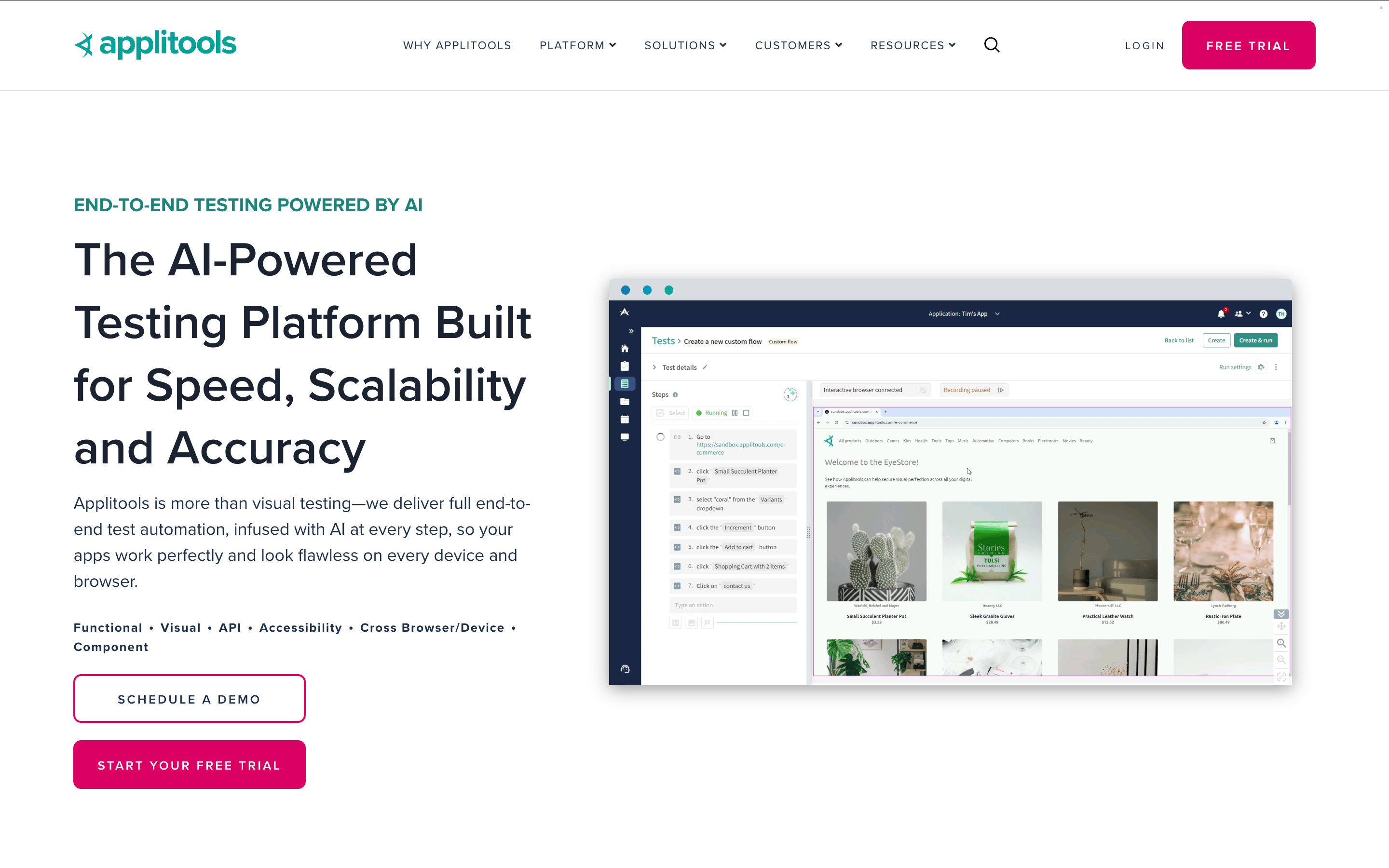
At its core is Applitools' innovative visual validation technology. Using advanced AI algorithms, it detects visual regressions that traditional automated browser testing tools may overlook, such as layout shifts, color changes, or rendering issues.
- Cross-browser and device testing: Verifies visual integrity seamlessly across multiple browsers, devices, and screen resolutions.
- Test framework integrations: Works seamlessly with popular testing frameworks such as Selenium, Cypress, Playwright, and TestCafe, enhancing your existing testing workflow.
- CI/CD-ready: Integrates effortlessly with popular continuous delivery platforms, helping teams maintain UI quality with every code deployment.
Teams prioritizing visual perfection and consistency in their web application functional testing tools will find Applitools uniquely suited to their requirements.
Visit Applitools Website | G2 Reviews
11. BrowserStack

BrowserStack is a cloud-based testing platform renowned for enabling seamless testing of web and mobile applications on real devices. As one of the top automated testing tools for web applications, it delivers accuracy and reliability, ensuring your app consistently performs well across various environments.
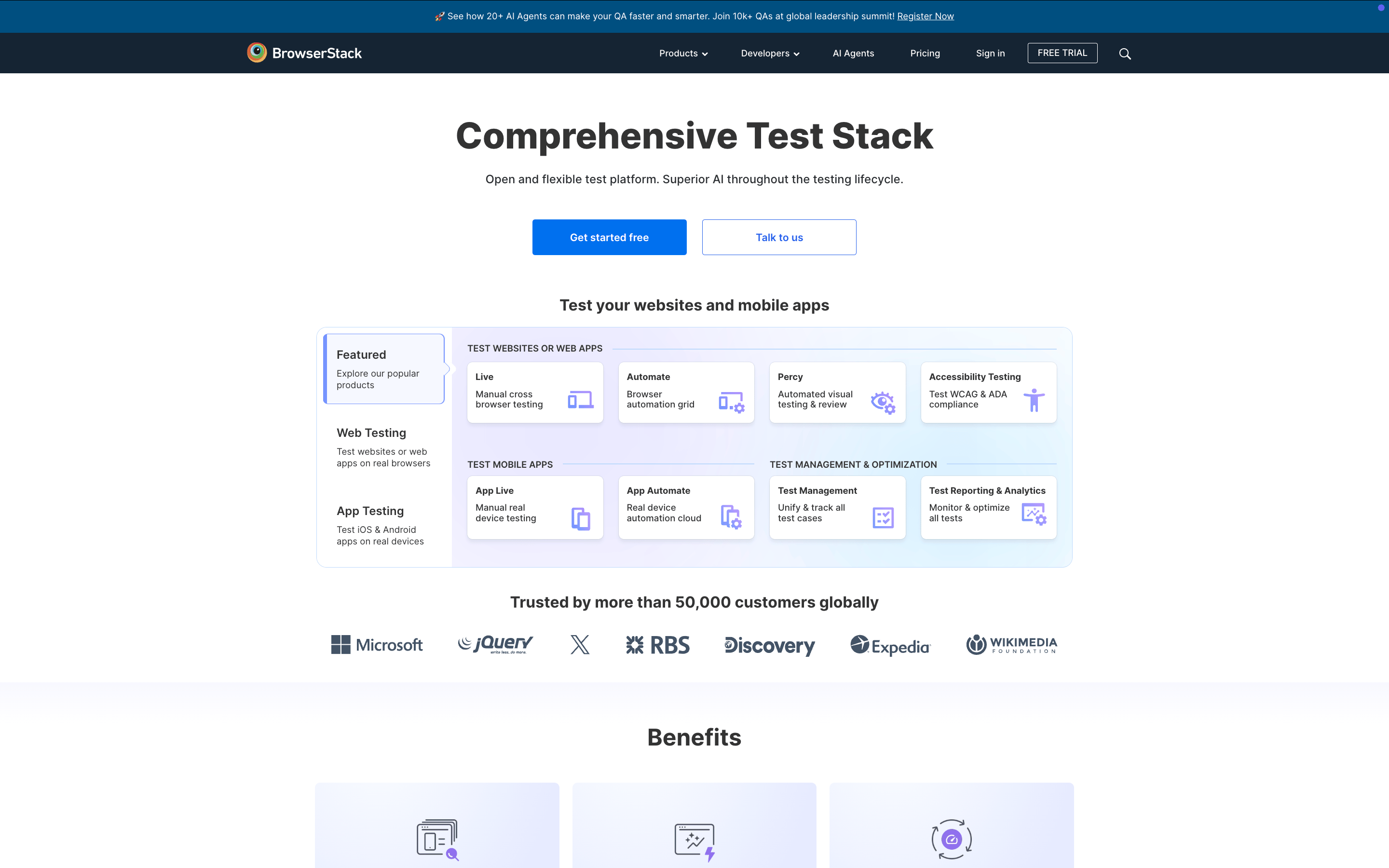
One significant advantage of BrowserStack is its extensive real-device cloud. Testers have instant access to thousands of genuine mobile and desktop devices, eliminating guesswork from your testing scenarios. This ensures that your tests closely mirror real-world user experiences.
- Support for multiple automation frameworks: Effortlessly integrate and execute tests written in Selenium, Cypress, Appium, and Playwright, among others.
- Live interactive testing: Easily debug applications in real-time with intuitive, live testing capabilities.
- Robust CI/CD integrations: Seamlessly connects with popular CI/CD tools like Jenkins, Azure DevOps, CircleCI, and GitHub Actions for continuous testing.
BrowserStack is a reliable choice if your team seeks powerful browser testing automation tools with a strong emphasis on device realism and comprehensive integration capabilities.
Visit Browserstack Website | G2 Reviews
12. Testim

Testim is a low-code, AI-powered automation platform designed specifically to streamline test creation and maintenance for agile teams. Known for its rapid setup and easy-to-use interface, Testim simplifies the adoption of website automation testing tools.

The platform stands out due to its fast, intuitive test creation. With smart locator technology, Testim identifies UI elements accurately, significantly enhancing test reliability and reducing script maintenance. Its AI-driven self-healing tests automatically adapt to UI changes, keeping your test suites robust and up-to-date.
- Fast and reliable test creation: Quickly build automated tests without extensive coding, saving valuable time.
- Seamless CI/CD integration: Integrates smoothly with Jenkins, GitLab, CircleCI, and Azure DevOps, fitting effortlessly into agile development cycles.
- Detailed analytics and reporting: Provides insightful test reports, helping teams pinpoint issues swiftly and accurately.
For agile teams prioritizing speed, adaptability, and ease of use in web application functional testing tools, Testim emerges as a compelling choice.
Visit Testim Website | G2 Reviews
13. QA Wolf

QA Wolf offers a unique approach among automated testing tools for web applications as a fully managed test automation service. Rather than simply providing the software, QA Wolf actively builds, runs, and maintains automated test suites for your team, significantly easing your in-house QA responsibilities.

With QA Wolf, your team receives comprehensive end-to-end testing support. Their experts handle everything from initial test design to ongoing execution and maintenance. This frees your internal team to focus on development and other strategic activities, ensuring smoother workflows and faster releases.
- Managed automation: QA Wolf designs and manages your tests, removing complexity from your team.
- Continuous test maintenance: Automatically adjusts tests to keep pace with your application's ongoing changes.
- Clear and detailed reporting: Provides insightful test results and actionable feedback to your team in real-time.
If your goal is to effortlessly scale your QA capabilities without expanding your internal overhead, QA Wolf offers a compelling managed approach to browser testing automation.
Visit QA Wolf Website | G2 Reviews
14. Virtuoso

Virtuoso is an innovative AI-powered test automation platform that leverages natural language to simplify test creation. This intuitive method enables testers of all skill levels to rapidly develop effective test cases without deep scripting expertise.

Virtuoso's advanced AI-driven self-healing capabilities automatically adapt tests when changes occur in your application's UI, dramatically reducing the effort typically associated with test maintenance. By ensuring tests remain stable, Virtuoso significantly enhances productivity and reliability.
- Natural language test creation: Write tests easily using plain English commands, making automated browser testing accessible to everyone.
- Cross-browser compatibility: Confidently test across multiple browsers, ensuring consistent user experiences.
- CI/CD integrations: Integrate effortlessly into popular CI/CD pipelines such as Jenkins, GitLab, and GitHub Actions for continuous testing.
Virtuoso is a valuable addition to any toolkit, especially if your team needs powerful website automation testing tools that simplify test maintenance and reduce manual workload.
|
FAQs
What are “automated testing tools for web applications,” and why do teams use them?
They’re tools/frameworks that automate browser-based checks (UI flows, regressions, cross-browser compatibility, sometimes API + visual checks) so teams can catch bugs earlier, reduce manual effort, and ship faster with more confidence.
How do I choose between open-source tools (like Selenium) and commercial platforms (like Katalon)?
Open-source tools offer maximum flexibility but usually require more engineering effort to build/maintain frameworks and reporting. Commercial platforms typically reduce setup/maintenance with built-in test creation, execution, reporting, and integrations—useful when you want faster adoption and less framework overhead.
What are the top evaluation criteria when selecting a web testing tool?
Common must-check criteria are: cross-browser support, CI/CD integration, scalability/parallel execution, test maintainability (self-healing, stable locators, POM support), and reporting (logs, screenshots/videos, analytics).
Do I need one tool or multiple tools for good coverage?
Often you can use one primary UI automation tool plus add-ons depending on needs (e.g., visual testing, device cloud, or API testing). Some platforms bundle multiple testing types (UI + API + reports) to reduce tool sprawl; others excel at one slice and integrate with the rest.
What’s a practical “starter stack” for most web apps in 2025?
A common pattern is: UI automation tool (Selenium/Playwright/Cypress or an all-in-one like Katalon) + CI runner (GitHub Actions/Jenkins/Azure DevOps) + reporting/artifacts (HTML reports, screenshots/videos) + optional cloud browser/device grid for cross-browser scale.


